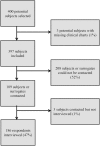Feasibility of telephone-administered interviews to evaluate long-term outcomes of trauma patients in urban Ethiopia
- PMID: 30588508
- PMCID: PMC6280902
- DOI: 10.1136/tsaco-2018-000256
Feasibility of telephone-administered interviews to evaluate long-term outcomes of trauma patients in urban Ethiopia
Abstract
Background: Little is known about long-term functional outcomes of trauma patients in low-income and middle-income countries. In sub-Saharan Africa most studies of injury only collect data through emergency department disposition or hospital discharge, and methods of collecting long-term data are subject to significant bias. With the recent increase in access to mobile telephone technology, we hypothesized that structured, telephone-administered interviews now offer a feasible means to collect data about the long-term functional outcomes of trauma patients in urban Ethiopia.
Methods: We piloted a telephone-administered interview tool based on the Glasgow Outcome Scale-Extended. Using departmental logbooks, 400 consecutive patients presenting to two public referral hospitals were identified retrospectively. Demographics, injury data, and telephone numbers were collected from medical records. When a telephone number was available, patients or their surrogates were contacted and interviewed 6 months after their injuries.
Results: We were able to contact 47% of subjects or their surrogates, and 97% of those contacted were able and willing to complete an interview. At 6-month follow-up, 22% of subjects had significant persistent functional disability. Many injuries had an ongoing financial impact, with 17% of subjects losing or changing jobs, 18% earning less than they had before their injuries, and 16% requiring ongoing injury-related medical care. Lack of documented telephone numbers and difficulty contacting subjects at recorded telephone numbers were the major obstacles to data collection. Language barriers and respondents' refusal to participate in the study were not significant limitations.
Discussion: In urban Ethiopia, many trauma patients have persistent disability 6 months after their injuries. Telephone-administered interviews offer a promising method of collecting data about the long-term trauma outcomes, including functional status and the financial impact of injury. These data are invaluable for capacity building, quality improvement efforts, and advocacy for injury prevention and trauma care.
Level of evidence: III, retrospective cohort study.
Keywords: Africa; functional status; global trauma; injury; outcomes; research methods.
Conflict of interest statement
Competing interests: None declared.
Figures


Similar articles
-
Feasibility of a Cellular Telephone Follow-Up Program After Injury in Sub-Saharan Africa.World J Surg. 2020 Aug;44(8):2533-2541. doi: 10.1007/s00268-020-05529-8. World J Surg. 2020. PMID: 32347352
-
Value and Feasibility of Telephone Follow-Up in Ethiopian Surgical Patients.Surg Infect (Larchmt). 2020 Aug;21(6):533-539. doi: 10.1089/sur.2020.054. Epub 2020 Apr 16. Surg Infect (Larchmt). 2020. PMID: 32301651 Free PMC article.
-
The Association of Trauma Center Transport and Long-term Functional Outcomes in Head-injured Older Adults Transported by Emergency Medical Services.Acad Emerg Med. 2020 Mar;27(3):207-216. doi: 10.1111/acem.13915. Epub 2020 Feb 3. Acad Emerg Med. 2020. PMID: 31917495
-
Telephone screening for hazardous drinking among injured patients seen in acute care clinics: feasibility study.Alcohol Alcohol. 2006 Jul-Aug;41(4):438-45. doi: 10.1093/alcalc/agl031. Epub 2006 May 5. Alcohol Alcohol. 2006. PMID: 16679344 Clinical Trial.
-
Mobile Phone Surveys for Collecting Population-Level Estimates in Low- and Middle-Income Countries: A Literature Review.J Med Internet Res. 2017 May 5;19(5):e139. doi: 10.2196/jmir.7428. J Med Internet Res. 2017. PMID: 28476725 Free PMC article. Review.
Cited by
-
Neurotrauma from fall accidents in Ethiopia.Brain Spine. 2024 Apr 10;4:102792. doi: 10.1016/j.bas.2024.102792. eCollection 2024. Brain Spine. 2024. PMID: 38983751 Free PMC article.
-
Feasibility and acceptability of mobile phone-based triage tool to identify discharged trauma patients in need of further care in Cameroon.Trauma Surg Acute Care Open. 2023 Nov 20;8(1):e001157. doi: 10.1136/tsaco-2023-001157. eCollection 2023. Trauma Surg Acute Care Open. 2023. PMID: 38020864 Free PMC article.
-
Early predictors of long-term participation in patients with severe acquired traumatic injury discharged from Intensive Rehabilitation Unit.Eur J Phys Rehabil Med. 2024 Oct;60(5):802-809. doi: 10.23736/S1973-9087.24.07955-3. Epub 2024 Sep 5. Eur J Phys Rehabil Med. 2024. PMID: 39235254 Free PMC article.
-
Neurotrauma clinicians' perspectives on the contextual challenges associated with traumatic brain injury follow up in low-income and middle-income countries: A reflexive thematic analysis.PLoS One. 2022 Sep 19;17(9):e0274922. doi: 10.1371/journal.pone.0274922. eCollection 2022. PLoS One. 2022. PMID: 36121804 Free PMC article.
-
Neurotrauma clinicians' perspectives on the contextual challenges associated with long-term follow-up following traumatic brain injury in low-income and middle-income countries: a qualitative study protocol.BMJ Open. 2021 Mar 4;11(3):e041442. doi: 10.1136/bmjopen-2020-041442. BMJ Open. 2021. PMID: 33664068 Free PMC article.
References
-
- World Health Organization Injuries and violence: the facts. Geneva: World Health Organization, 2010.
-
- Murray CJ, Vos T, Lozano R, Naghavi M, Flaxman AD, Michaud C, Ezzati M, Shibuya K, Salomon JA, Abdalla S, et al. . Disability-adjusted life years (DALYs) for 291 diseases and injuries in 21 regions, 1990-2010: a systematic analysis for the Global Burden of Disease Study 2010. Lancet 2012;380:2197–223. 10.1016/S0140-6736(12)61689-4 - DOI - PubMed
LinkOut - more resources
Full Text Sources
Research Materials
